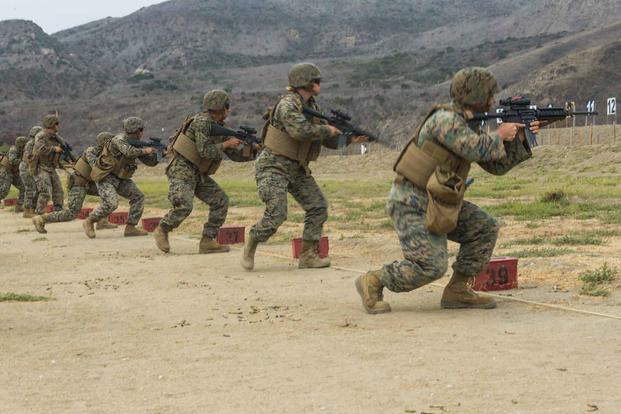U.S. Marines are known for their shooting ability, but marksmanship officials in the Corps expect to see expert rates plummet when troops begin attempting a new, combat-focused rifle qualification course this fall.
As of Oct. 1, active-duty Marines will be required to qualify with the new Annual Rifle Qualification, or ARQ, a modernized course of fire crafted to replace the current Annual Rifle Training, or ART, qualification course, which has been used since the early 1900s.
Instead of shooting at fixed targets from 200, 300 and 500 yards, the new course will force Marines to hit lethal zones marked on the head and chest of stationary and moving targets more like they would in battle.
Read Next: Marine Corps Rifle Qualification Is Getting Its First Major Overhaul in More Than 100 Years
"Marksmanship is fundamental to who we are as Marines," Col. Mark Liston, commander of the Weapons Training Battalion at Quantico, Virginia, told reporters Tuesday. "The ARQ course of fire is very mature at this point. We have had several annual combat marksmanship symposiums that have determined the need to update how we assess the marksmanship of Marines and sailors assigned to the Fleet Marine Force]."
Marksmanship officials expect that the more challenging ARQ course and new scoring standards will result in far fewer experts when Marines first make the switch.
"The current rate for expert is 65%, whereas with ARQ we are anticipating 6% to be experts," Gunner John Costa, director of the Marksmanship Program Management Section at the Weapons Training Battalion, told reporters.
But Costa stressed that some factors were not applied when Marines shot the ARQ course of fire during its development.
When Marines first went through the ARQ, "there was no chance for requalification ... they just showed up and shot it once. They went through the course of fire, and that was it," Costa said, explaining that Marines will be offered the opportunity to requalify to improve their rating.
Also, Marines participating in the ARQ development received no preparatory training, which will change once the new standard is implemented, he said.
"There was a level of uncomfortableness with Marines because it was their first time doing it," Costa said. "I see those numbers adjusting in a positive direction."
He also pointed out that the Marine Corps never updated the current ART to adjust for the service's adoption of the Rifle Combat Optic, or RCO, more than 15 years ago.
"Nothing was ever updated with the advent of the RCO," Costa said. "That is something key for everyone to understand: That was a course of fire designed for iron sights; the Marines then gave them a 4X optic."
When considering that the current expert rate in ART is 65%, "we've really got to consider how well the equipment is helping us out and maybe we should have increased some standards a while ago."
The scoring for the new qualification course has also changed.
Under current qualification standards, Marines fire 50 rounds, worth five points each, depending on shot placement on targets. They must earn at least 190 points for the marksman badge; at least 210 for sharpshooter; and a minimum of 220 to earn the expert rating.
The ARQ course of fire consists of 50 destroy targets with lethal zones marked in the chest and face area. There are also three types of drills that put Marines through a sequenced scenario involving an enemy at close range.
Marines will shoot four iterations of the 25-yard failure to stop drill, four iterations of the 25-yard box drill, and two iterations of the failure to stop drill while moving from the 25-yard line to the 15-yard line.
To qualify as marksman, Marines must score 15 to 30 destroys and one successful completion of any type of drill. Sharpshooter requires 31 to 42 destroys and one successful completion of two types of drills. Expert requires 43 to 50 destroys and one successful completion of each type of drill.
"If you look at a marksman, he is lethal, but he is most lethal in the collective, whereas if you have an expert, that Marine is able to kill a lot of enemy on his own," Costa said.
-- Matthew Cox can be reached at matthew.cox@military.com.
Related: Marines Overhaul Rifle Qualification to Feature Moving Targets, Night Fire













